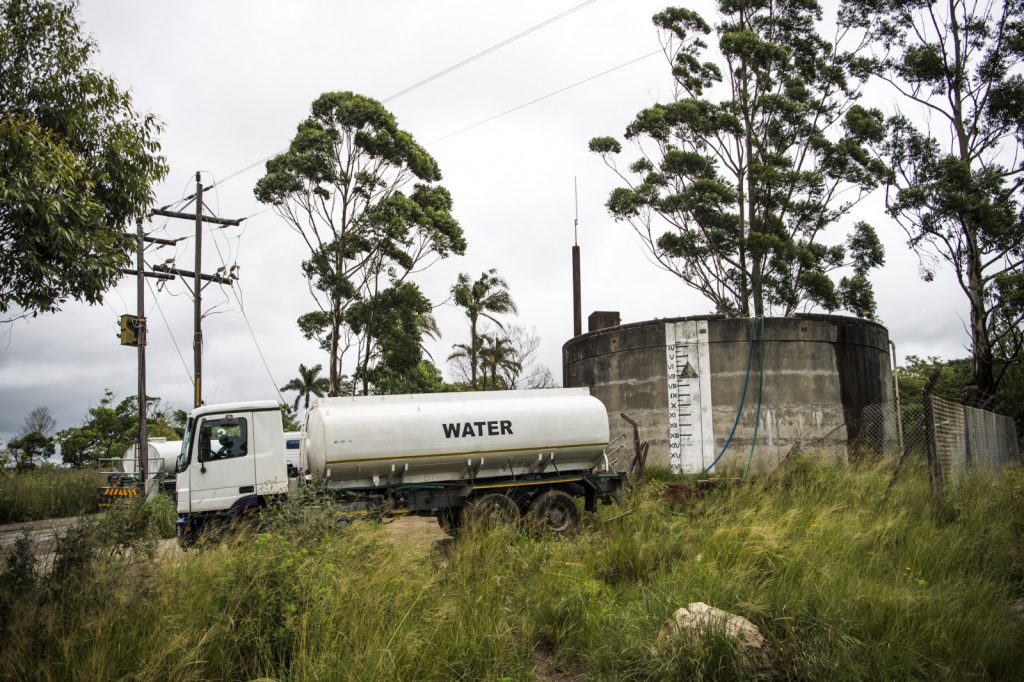Residents of the towns and villages falling under the Ugu district municipality have been fighting for a secure water supply for years. (Photo Delwyn Verasamy)
While all eyes — and efforts — are focused on restoring the water supply to parts of Durban still reeling from last month’s deadly floods, people living on the KwaZulu-Natal South Coast have not had water for months.
Residents of the towns and villages falling under the Ugu district municipality have been fighting for a secure water supply for three years, with interventions by Water and Sanitation Minister Senzo Mchunu last October and KwaZulu-Natal Premier Sihle Zikalala in February doing little to alleviate the water crisis.
Now, fed-up South Coast residents belonging to 18 ratepayer bodies and business associations in the belt of towns running from Hibberdene to Port Edward are preparing to go on a payment go-slow to force Ugu to deliver the water they so desperately need.
Derrick Morris, the deputy chairperson of the KwaZulu-Natal Ratepayers Association, an umbrella body for residents’ organisations along the coast, said the three-year water crisis in the district, which has been plagued by supply problems for a decade, had worsened in recent months.
The organisation has requested a meeting with Ugu management next week, at which they will be told that about 60 000 ratepayers will be withholding the bulk of their municipal payments until a regular water supply is restored.
Ugu is responsible for supplying about 750 000 residents of the district — which includes the Umdoni, Ray Nkoneyeni, Umuziwabantu and uMzumbe local municipalities — with most of its revenue coming from the towns dotted along the coast, which are about to start the payment boycott.
Political infighting and corruption in the municipality, along with an ageing water infrastructure, vandalism and theft, have resulted in residents along the coast and inland being left without water for large parts of the past three years.
The situation has been worsened by flooding in the northern part of the district and in Durban last month, which has also seen a diversion of resources to ensure that water and electricity supplies are restored and that roads and bridges are rebuilt.
“We have reached the point where we have had enough. We are in the process of instituting legal action against the municipality, which may take up to four years to come to fruition. In the interim we are embarking on a payment boycott — and, if necessary, mass action — to force Ugu to do something,” Morris said.
Residents had decided to make the minimal payments rather than completely withholding what was owed to Ugu, so that their protest remained within the law, according to Morris.
“We know that it is illegal to withhold payment, so we will go on a payment go-slow and pay only a little bit at a time until Ugu gets the message. We have met as the ratepayers associations and are ready. We will go for a meeting with the municipality next week — I don’t think it will materialise — and then we start the go-slow,” Morris said.
Residents were also looking at varying forms of mass action to back up their payment protest, but would only take to the streets “as a last resort”.
“This is not a political thing. Everybody is suffering under Ugu. They have killed tourism here. Businesses are closing down because they are suffering massive losses. We have some areas that haven’t had water for three months and nobody is doing anything about it,” Morris said.
Vijay Naidoo, president of the South Coast Chamber of Commerce and Industry, said the water situation was “desperate” and that there had not been an improvement since last year, despite the action promised by Mchunu and Zikalala.
 Water trucks fill up and transport water to the reservoir Photo Delwyn Verasamy
Water trucks fill up and transport water to the reservoir Photo Delwyn Verasamy
“We were encouraged when the minister and the premier came down here in February and read the riot act to the municipality, but since then the situation has got worse if anything,” Naidoo said.
Naidoo said that Ugu was “unresponsive” to people’s needs and appeared not to have a plan to deal with the water crisis.
“There is absolutely no accountability. The municipality puts out daily bulletins to councillors about interruptions to supply and on social media and that is it. It is impossible to get hold of anybody beyond that,” he said.
Naidoo, like many residents, installed two 10 000 litre tanks at his home in Oslo Beach, but he is dependent on Ugu to fill the tanks when they run dry. He last had running water three weeks ago.
“There has been a collapse of our water system and they really don’t appear to know where to start. The floods have contributed, but they are now being used as another convenient alibi to skirt certain issues,” Naidoo said.
He estimates that, at any given time, nearly 60% of the district does not have water.
“We are in a very difficult situation. Things are bad here, so how must they be for people living inland from us in the rural areas. We can go to the shop and buy water to drink. What can they do?” Naidoo said.
Ugu spokesperson Mondli Ncane had not responded to questions from Mail & Guardian by the time of writing.
[/membership]